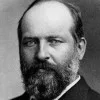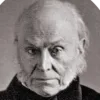The will of the nation, speaking with the voice of battle and through the amended Constitution, has fulfilled the great promise of 1776 by proclaiming “liberty throughout the land to all the inhabitants thereof.” The elevation of the negro race from slavery to the full rights of citizenship is the most important political change we have known since the adoption of the Constitution of 1787. No thoughtful man can fail to appreciate its beneficent effect upon our institutions and people. It has freed us from the perpetual danger of war and dissolution. It has added immensely to the moral and industrial forces of our people. It has liberated the master as well as the slave from a relation which wronged and enfeebled both. It has surrendered to their own guardianship the manhood of more than 5,000,000 people, and has opened to each one of them a career of freedom and usefulness.
James A. Garfield (1831-1881) US President (1881), lawyer, lay preacher, educator
Inaugural address (4 Mar 1881)
(Source)
Quotations about:
emancipation
Note not all quotations have been tagged, so Search may find additional quotes on this topic.
Have we done it? Have we given freedom to the black man? What is freedom? Is it mere negation? Is it the bare privilege of not being chained, of not being bought and sold, branded and scourged? If this is all, then freedom is a bitter mockery, a cruel delusion, and it may well be questioned whether slavery were not better.
James A. Garfield (1831-1881) US President (1881), lawyer, lay preacher, educator
“Suffrage and Safety,” speech, Ravenna, Ohio (4 Jul 1865)
(Source)
Who but shall learn that freedom is the prize
Man still is bound to rescue or maintain;
That nature’s God commands the slave to rise,
And on the oppressor’s head to break the chain.
Roll, years of promise, rapidly roll round,
Till not a slave shall on this earth be found.John Quincy Adams (1767-1848) US President (1825-29)
Diary (1826-10-30)
(Source)
Sonnet written on the birthday of his father, John Adams, six months after his death.
Until justice is blind to color, until education is unaware of race, until opportunity is unconcerned with the color of men’s skins, emancipation will be a proclamation but not a fact. To the extent that the Proclamation of Emancipation is not fulfilled in fact, to that extent we shall have fallen short of assuring freedom to the free.
Lyndon B. Johnson (1908-1973) American politician, educator, US President (1963-69)
Speech (1963-05-30), Memorial Day, Gettysburg, Pennsylvania
(Source)
(Source (Video))
Speaking during the 100th Anniversary of the (second) Emancipation Proclamation.
Though spoken while still Vice President, variations of these phrases became a rhetorical favorite of Johnson's through his presidency.
What a stupendous, what an incomprehensible machine is man! who can endure toil, famine, stripes, imprisonment & death itself in vindication of his own liberty, and the next moment be deaf to all those motives whose power supported him thro’ his trial, and inflict on his fellow men a bondage, one hour of which is fraught with more misery than ages of that which he rose in rebellion to oppose.
Thomas Jefferson (1743-1826) American political philosopher, polymath, statesman, US President (1801-09)
Letter (1786-06-22) to Jean Nicholas Démeunier
(Source)
This was part of a response to a draft article on the United States ("Essai sur les États-Unis") being put together for the Encyclopédie Méthodique which Démeunier had passed by Jefferson for comment. Jefferson requested changes on a number of items, including a passage on a new Virginia slave law and the failure of some of the delegates to propose an amendment for the gradual emancipation of slaves (Jefferson had not attended the legislative session, being in France). This quotation appeared toward the end of that proposed revision.
In the end, Démeunier provided this French translation in his article:L’homme est un être bien étonnant et bien incompréhensible! pour défendre sa liberté, il souffre la fatigue, la faim, les coups de fouet, la prison et la mort, et le moment d’après les nobles sentimens qui l’ont soutenu dans de cruelles épreuves, ne font plus d’impression sur lui, et il impose à d’autres hommes une servitude qui, dans la durée d’une heure, produit plus de peines et de douleur, que l’assujettissement contre lequel il a pris les armes, n’en eût produit dans des siecles.




